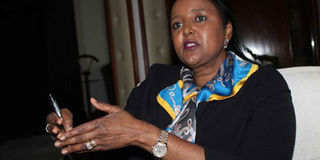Amina says she is best person to help African Union

Amina Mohamed, the Cabinet Secretary for Foreign Affairs and International Trade, in Nairobi on August 25, 2016. PHOTO | ANTHONY OMUYA | NATION MEDIA GROUP
What you need to know:
As the Kenyan top diplomat published her agenda for the AU, the government has dispatched officials led by Deputy President William Ruto and a number of cabinet secretaries to specified countries around the continent to win as much support as possible ahead of the elections scheduled for January.
Mr Ruto is the leader of a special Cabinet committee that also includes Education CS Fred Matiang’i, Raychelle Omamo of Defence, Prof Judi Wakhungu (environment), Youth and Gender CS Sicily Kariuki, Information CS Joe Mucheru, Charles Keter of energy, Agriculture’s Willy Bett and Dr Cleopa Mailu who is in charge of Health.
Foreign Affairs Cabinet Secretary Amina Mohamed says her vast global contacts make her the best person to help the African Union to earn its rightful place in international politics.
In her vision to be the next AU chairperson, Ms Mohamed says her three-decades experience in dealing in international affairs has enabled her to learn about helping the continent to integrate as well as play an influential role globaly.
“I have shown my mettle during the most difficult times for the continent,” she says in her vision statement made available on Sunday.
“I will leverage on my rich experience and contacts across the globe and I shall not hesitate to lobby for positions, partnerships and pacts as well as advocate a stronger and respected African voice in the international arena.”
As the Kenyan top diplomat published her agenda for the AU, the government has dispatched officials led by Deputy President William Ruto and a number of cabinet secretaries to specified countries around the continent to win as much support as possible ahead of the elections scheduled for January.
Mr Ruto is the leader of a special Cabinet committee that also includes Education CS Fred Matiang’i, Raychelle Omamo of Defence, Prof Judi Wakhungu (environment), Youth and Gender CS Sicily Kariuki, Information CS Joe Mucheru, Charles Keter of energy, Agriculture’s Willy Bett and Dr Cleopa Mailu who is in charge of Health.
AROUND CONTINENT
The plan is for each of them to go around the continent to places like Chad, Cote d’Ivoire, Ghana, Liberia, Sierra Leone, Mali, Algeria, Zimbabwe, Guinea, Nigeria and Lesotho. They have been explaining how the Kenyan candidate will help the AU in dealing with such issues as its energy shortage, youth problems, gender, trade, poverty, food supply and political instability.
This past week, Mr Ruto was in Chad, Cote d’Ivoire, Algeria, Sierra Leone and Mali, to try and win votes from a region that is also fielding a candidate for the position to be left vacant by South Africa’s Nkosazana Dlamini-Zuma.
Mr Ruto’s office has claimed Cote d’Ivoire, Nigeria, Algeria have all agreed to back the Kenyan candidate even though other political undercurrents are at play.
Cote d’Ivoire and Mali produced the first and second AU Commission chairs, both first-term officials. But the two countries with Guinea, Sierra Leone and Ghana belong to the 15-member West African bloc, Ecowas, which has produced a candidate in Senegal’s Abdoulaye Bathily.
Algeria is in the Francophone with Senegal and Equitorial Guinea which is also fielding its Foreign minister Agapito Mba Mokuy for the job. Francophone countries have previously rallied behind Gabon’s Jean Ping, who served between 2008 and 2012. Another notable candidate is Dr Pelonomi Venson-Moitoi of Botswana, backed by Sadec, although specific member countries from his bloc have said they may back Mohamed.
The message from Kenya has been the same; their candidate will help improve intra-trade, integration, improving the African voice and dealing with insecurity.
'REGIONAL INTEGRATION'
“The AU leadership must focus on intra-African trade and regional integration; ingredients of a rising continent. We believe CS Amina Mohamed has the credentials to drive Africa’s agenda at the world stage,” Mr Ruto said after meeting with Chadian President Idriss Deby, who is also the AU chairman.
“Majority of resolutions at the United Nations directly touch on African countries. It is, therefore, imperative that Africa gets more say.”
Africa’s intra-trade is poor, with countries buying only 14 per cent of goods from each other, according to figures from the World Bank.
“As a continent, we should encourage trade and commerce among ourselves before venturing into outside markets. That way, we will buy Africa and build Africa,” Mr Ruto said after meeting with Nigerian President Muhammadu Buhari in Abuja on Friday.
Ms Mohamed says in her vision about supporting the “revolution” of infrastructure to create a seamless connection through road, air and sea. A lot of these will require sovereign decisions from member states. But it will cost Africa about $100 billion (Sh10 trillion) every year for 10 years to reach that level.
But Africa and the AU are poor and require heavy donor support. The AU itself gets nine out of Sh10 in its budget from donors.
Yet Ms Mohamed talks about helping the AU to be self-reliant and states dependent on own resources.
“I am an African with impeccable pan-African credentials. I bring on board competencies and experience that shall make it possible to secure the vision of Agenda 2063,” she said.





